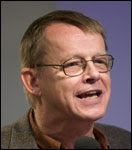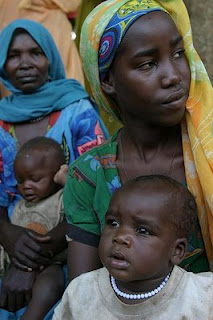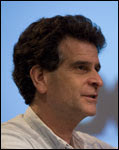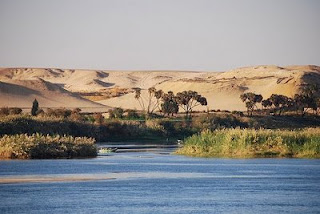Showing posts from category *Main.
-
‘Earth 2100’ To Explore Climate, Natural Resources, Population Growth
›June 2, 2009 // By Rachel WeisshaarABC’s Earth 2100 documentary, airing tonight at 9:00 p.m. EST, will feature many ECSP speakers—including Jared Diamond and Peter Gleick—as well as the Center for a New American Security’s (CNAS) Clout and Climate Change War Game. Held in Washington, D.C., in July 2008, the war game focused on the national security implications of climate change.
Earth 2100 explores possible worst-case scenarios for this century that could be triggered by a “perfect storm” of population growth, resource depletion, and climate change. Environmental security expert Thomas Homer-Dixon tells host Bob Woodruff that “energy, climate food, population, economic pressures—any one of these challenges might be very serious in and of itself. But because they are happening all simultaneously, it’s going to be very difficult for our governments to cope.”
During the climate-change war game, “every country sort of hewed to what you would expect,” said CNAS Vice President for Natural Security Sharon Burke at an ECSP event earlier this year.
“The EU team spent the first two hours debating whether they could really be a country; the Indian team instantly came up with a negotiating strategy that sounded cooperative and brilliant but was completely impossible to execute; the Chinese team was, ‘No, we’re not going to do anything unless you pay us’; and the American team was keen to lead, only nobody was following,” she said.
One of the key lessons from the game, Burke added, was that “everything comes down to what China is prepared to do.” She also described insights from the war game in a New Security Beat guest post.
Several war-game participants are now members of the Obama administration, including Todd Stern, the lead U.S. negotiator on climate change; Michèle Flournoy, under secretary of defense for policy; and David Sandalow, assistant secretary for international affairs at the Department of Energy.
An ABC producer working on Earth 2100 consulted ECSP Director Geoff Dabelko earlier this year. -
VIDEO: Environment Key to Resolving Conflicts, Building Peace, Says UN Environment Programme Director Achim Steiner
›June 2, 2009 // By Rachel Weisshaar“Addressing the issue of the environment in the context of conflict resolution, conflict prevention, peacekeeping, [and] peacebuilding becomes ever more important because we know from everything we have learned—and are learning every day—about climate change that one thing is for certain: The world is going to be under more stress,” says UN Environment Programme (UNEP) Director Achim Steiner in a short expert interview on YouTube.
Yet in another original Environmental Change and Security Program (ECSP) video, Steiner emphasizes that environmental issues do not lead inexorably to conflict. “History shows that human societies are not prone to looking for conflict but rather for conflict resolution, particularly when it comes to fundamental elements of life support systems, be it water, or be it clean air or other issues—we have seen the model of cooperation emerge.”
Steiner was at the Wilson Center in March 2009 for the launch of From Conflict to Peacebuilding: The Role of Natural Resources and the Environment, a new report by UNEP’s Disasters and Conflicts Programme. According to From Conflict to Peacebuilding:- Forty percent of intrastate conflicts within the past 60 years have been strongly linked to natural resources.
- Such conflicts are twice as likely to relapse within the first five years of peace.
- Less than a quarter of peace agreements for these conflicts address natural-resource issues.
- Forty percent of intrastate conflicts within the past 60 years have been strongly linked to natural resources.
-
Hans Rosling Animates DHS Data, Moves Debate
›June 1, 2009 // By Brian Klein “Statistics should be the intellectual sidewalks of a society, and people should be able to build businesses and operate on the side of them,” said Gapminder Foundation Director Hans Rosling at a discussion hosted by the Wilson Center’s Environmental Change and Security Program on May 26, 2009. In his spirited and often humorous remarks, Rosling praised the 25-year-old Demographic and Health Surveys (DHS) program, which is funded by the U.S. Agency for International Development (USAID) and implemented by Macro International, Inc., as “public-private partnership at its best.” The DHS program works with countries’ health ministries to collect data on family planning, child and maternal health, disease prevalence, and other health indicators, and makes the data freely available for public use.
“Statistics should be the intellectual sidewalks of a society, and people should be able to build businesses and operate on the side of them,” said Gapminder Foundation Director Hans Rosling at a discussion hosted by the Wilson Center’s Environmental Change and Security Program on May 26, 2009. In his spirited and often humorous remarks, Rosling praised the 25-year-old Demographic and Health Surveys (DHS) program, which is funded by the U.S. Agency for International Development (USAID) and implemented by Macro International, Inc., as “public-private partnership at its best.” The DHS program works with countries’ health ministries to collect data on family planning, child and maternal health, disease prevalence, and other health indicators, and makes the data freely available for public use.
The Beauty Behind the Data
Rosling uses Gapminder’s signature “moving bubble” Trendalyzer software—which Google purchased and made available as “Motion Chart”—to graphically demonstrate global health, economic, and environmental trends. Gapminder uses data from several sources, including DHS surveys, to generate its illuminating displays.
“Sweden, during the last hundred years, didn’t achieve [the] Millennium Development Goal rate” for yearly reductions in child mortality, Rosling explained. “We are putting goals for Tanzania, Bangladesh that [were] never…achieved by any country in West Europe or North America.” The remarkable thing, said Rosling, is that many low-income countries are achieving or even surpassing these demanding targets.
Free Access, Unified Formatting Are Top Priorities
Rosling stressed that access to data must be free, and admonished the World Bank, the Organisation for Economic Co-operation and Development (OECD), and others who charge for their statistics. “They say, ‘No, we can’t give the data to the people because they will make wrong comparisons, and they will make wrong conclusions,’” Rosling continued, “and I say ‘Yes, we call it freedom.’”
Rosling cautioned against “database-hugging disorder,” or statisticians’ tendency to guard their data because of concerns about budgets or misinterpretation. A better approach, he insisted, is to embrace innovations like the Creative Commons license, which encourages sharing information by offering a range of easy-to-understand legal protections and freedoms for creative works, data, and information.
In addition, “we don’t have a unified format for data,” Rosling said, and “that’s why the transaction costs are so enormously high, and that’s why those who put data together in unified format charge for it.” He cited YouTube as an excellent medium for broadening public distribution of data. To the audience’s delight, a live Google search for “sex, money, and health” returned a YouTube clip of one of his own presentations as its top hit.
Improving Lives With Data
“The worst environmental problem today is that two million children die of diarrhea [each year], and that billions of people drink their neighbors’ lukewarm feces,” said Rosling, and yet “water and sanitation data is very, very weak.” Collecting information from remote areas—often the most impoverished—is difficult. Measuring access to potable water is complicated because it requires community-based calculations, which do not fit into DHS’ household-centric methodology.
Rosling called upon young adults to work to “eradicate unnecessary disease and poverty in the world.” He also advocated improved post-graduate training in statistics, particularly in low-income countries.
Better statistical data will foment more effective solutions to development challenges—provided there are ambassadors like Rosling willing and able to unveil the beauty behind the numbers.
Photo: Hans Rosling. Courtesy of Dave Hawxhurst and the Wilson Center.
-
Weekly Reading
›Land grab or development opportunity? Agricultural investment and international land deals in Africa, a study conducted by IIED, FAO, and IFAD, is the first detailed study to examine large land acquisitions in sub-Saharan Africa.
The latest issue of Population and Environment (subscription required) includes articles on land, education, and fertility in Kenya; indigenous women and fertility in the Ecuadorian Amazon; and the impact of chemical exposure on sex ratios in Greece.
A partnership between local villages and the Bonobo Conservation Initiative has led to the establishment of a 1,847 square mile reserve in the Democratic Republic of the Congo, reports Mongabay.
A new article in the Encyclopedia of the Earth lists population growth rates (including births, deaths, and migration) by country, based on CIA data. -
Climate Change Not the Only Environmental Problem, Says U.K. Environment Secretary
›May 22, 2009 // By Rachel Weisshaar The Copenhagen climate conference will be “the most important gathering in human history,” said the United Kingdom’s environment secretary, Hilary Benn, at the Wilson Center on May 14, 2009 (full text of speech). While “an agreement on cutting emissions would be the biggest single step we could take to safeguard [natural] resources,” said Benn, “even such an agreement will not—indeed cannot—encompass all of the things we need to do to safeguard our environment.”
The Copenhagen climate conference will be “the most important gathering in human history,” said the United Kingdom’s environment secretary, Hilary Benn, at the Wilson Center on May 14, 2009 (full text of speech). While “an agreement on cutting emissions would be the biggest single step we could take to safeguard [natural] resources,” said Benn, “even such an agreement will not—indeed cannot—encompass all of the things we need to do to safeguard our environment.”
“The most glaring threat is that of dangerous climate change. But it is not the only example of the problems we create when we exploit the world’s resources unsustainably,” explained Benn.
“The spiraling price of food in 2008 was a wake-up call. Riots threatened political stability. Export bans threatened world trade. Wheat prices doubled, rice quadrupled. And another 75 million people were threatened by poverty and hunger,” Benn said.
Although food prices have fallen recently, continuing growth in the global population—expected to reach at least 9 billion by 2050—and rising standards of living in poor and middle-income countries mean that world food production will need to double by 2050. This demand for food—especially more meat and dairy products—will put increasing pressure on land and water. Conflicts could erupt over these scarce resources if they are not managed properly, Benn warned.
Already, wealthy governments and corporations are buying farmland in Africa and other parts of the developing world—leading to unrest. Widespread anger at South Korean company Daewoo’s proposal to purchase more than half of Madagascar’s arable land contributed to the ouster of former Malagasy President Marc Ravalomanana.
Benn highlighted an apparent Catch-22: “Development is the best way of lowering the rate of population growth and so, in turn, lowering the pressure on resources. But development also increases income, and therefore demand.”
The way to free ourselves from this cycle, Benn said, is to create an environmentally sustainable economy, so that economic development does not degrade the environment. He proposed:- Starting to build tomorrow’s sustainable economy even as we work to contain today’s economic crisis;
- Changing the incentives in our economies—through regulation and financial inducements—to promote environmentally sustainable choices;
- Creating the jobs that will power this new sustainable economy; and
- Working together as an international community to address water scarcity, food security, and biodiversity loss.
Benn called for U.S. leadership on climate change and other environmental issues: “We need America to apply all of its great energy to the task we, together, face.”
Photo: Hilary Benn. Courtesy of Dave Hawxhurst and the Wilson Center. -
Women’s Rights: A Silver Bullet for Development?
›May 21, 2009 // By Rachel Weisshaar Any veteran of the international development field will be familiar with the disclaimer that no single intervention, no matter how effective, is a “silver bullet.” But in The Means of Reproduction: Sex, Power, and the Future of the World, journalist Michelle Goldberg argues forcefully that there is one change that is key to solving environmental degradation, food insecurity, water scarcity, global health challenges, skewed gender ratios, poverty, and both under- and overpopulation: women’s empowerment.
Any veteran of the international development field will be familiar with the disclaimer that no single intervention, no matter how effective, is a “silver bullet.” But in The Means of Reproduction: Sex, Power, and the Future of the World, journalist Michelle Goldberg argues forcefully that there is one change that is key to solving environmental degradation, food insecurity, water scarcity, global health challenges, skewed gender ratios, poverty, and both under- and overpopulation: women’s empowerment.
Malthusian Anxieties
As Matthew Connelly documents in his book Fatal Misconception: The Struggle to Control World Population, the family-planning movement sometimes lapsed into questionable moral territory during its early years, when women’s rights were not among its chief motivations. Fortunately, it turns out that family planning is actually more successful when motivated by a larger desire to empower women than when spurred by fears of overpopulation (The Means of Reproduction, pp. 74-76; 84-85). Educated women are more likely to delay marriage, have fewer children, obtain good maternal care, and be less vulnerable to HIV/AIDS, write Caren Grown et al. in a literature review of gender equality and women’s health in The Lancet.
A Birth Dearth—or an Empowerment Dearth?
As Goldberg points out, empowering women is also the solution to slowing the rapid population decline being experienced in many European countries and some wealthy Asian ones. “In contemporary developed societies, birthrates are highest where support for working mothers is greatest, a fact conservatives simply ignore in their doomsday surveys of future European decrepitude,” says Goldberg (p. 204).
Thus, comparatively religious, socially conservative European countries like Italy and Poland have some of the lowest fertility rates on the continent (both 1.3 children per woman), while more secular countries like France and Sweden, with their generous paid parental leave policies, public day care, and after-school programs, have some of the highest (2.0 and 1.9, respectively).
Strong Women, Healthy Families
Women’s empowerment is key to human health. The more education a woman has, the healthier her children are likely to be, explains Goldberg (p. 75). In addition, as Grown et al. point out, “in societies such as Bangladesh, where husbands control most household resources, when women did own assets, household expenditure on children’s clothing and education was higher and the rate of illness among girls was reduced.”
But the connection between empowerment and health also works in the other direction: In sub-Saharan Africa, women constitute 57 percent of people living with HIV/AIDS—a direct result of women’s sexual, social, political, and economic subordination (pp. 224-225). Women often do not have the standing to refuse sex, or to demand that a man wear a condom. They also frequently lack the financial and educational resources needed to leave violent or unfaithful husbands (p. 225).
Bare Branches: Sex Ratios and Security
A preference for sons persists in many parts of the world—especially Asia—and the spread of ultrasound, which can detect the sex of a four-month-old fetus, has made sex-selective abortion hugely popular for couples seeking to have a son. But the growing imbalance between men and women has potentially grave security implications for countries such as China and India, warns Goldberg. As Valerie Hudson and Andrea den Boer point out, Indian states “with high sex ratios, such as Uttar Pradesh, have much higher violent crime rates than states with more normal sex ratios, such as Kerala.”
As Goldberg puts it, “as long as women lack an identity without a husband or a son, sex-selective abortion will continue to deform India’s—and Asia’s—demographics” (p.194). She isn’t hopeful about quick progress: “Like any democracy, India will probably find it easier to slouch toward disaster than to infuriate the defenders of patriarchy. Ultimately, though, unless the country finds a way to break through the encrustations of centuries of misogyny, its democracy itself could be in danger from an unmanageable excess of men” (p. 198).
Toward Nine Billion Hot, Hungry, Thirsty People
Goldberg’s take on the links among population, the environment, and security is admirably nuanced—although I would have appreciated a more extensive discussion of demographic security and population-environment links. She acknowledges that the food riots of 2008, combined with growing concern about water scarcity and climate change, may have generated more attention for family planning and reproductive health.
But she reminds us that the main population-related response to these problems—a commitment to decrease fertility in the developing world—misinterprets the causes. The food shortages were largely the result of growing consumption by middle-income people, combined with continued high consumption in the rich world. Climate change will undoubtedly become much worse if all people in the developing world start to live the high-carbon lifestyles we do in the West, but to date, climate change has been caused almost entirely by industrialized countries.
The Micro and the Macro
Goldberg’s storytelling skills are superb, making The Means of Reproduction both an exciting and enlightening read. She illustrates her broader arguments about women’s rights with compelling stories about individual women and men. She demands that we respect these people’s experiences while arguing powerfully against succumbing to the temptations of political correctness and relativism:
“In thinking about the situation of women in vastly different contexts, there are a number of dangers. One is assuming that Western ways are self-evidently superior and that all women would choose them, if only they could. But another is assuming that women in other cultures are so different from us that situations we would find intolerable—bearing child after child into grinding poverty; being utterly at the mercy of fathers, husbands, and brothers; having one’s clitoris sliced off with a razor—do not also cause them great pain” (p. 9).
Goldberg has pulled off an impressive feat: The Means of Reproduction is accessible enough to serve as an introduction to the debates around population and family planning, but complex enough to inform readers about the latest controversies and battlegrounds in the field. Goldberg does have an opinion, but it’s based on reams of research. Here’s hoping The Means of Reproduction finds a place in the canon.
Photo: Women and children at the health post at Sam Ouandja refugee camp in the Central African Republic. Courtesy of Pierre Holtz/UNICEF and Flickr user hdptcar. -
World-Renowned Inventor Dean Kamen Talks Water, Energy
›May 20, 2009 // By Rachel Weisshaar “If you tell the world you’re going to do something and they go, ‘Yeah…?’ it’s probably that you’re making an incremental change in something that the world is already doing reasonably well,” said renowned inventor Dean Kamen at a May 2009 meeting co-sponsored by the Wilson Center’s Environmental Change and Security Program and Program on Science, Technology, America, and the Global Economy. “I’d rather work on the really big stuff.”
“If you tell the world you’re going to do something and they go, ‘Yeah…?’ it’s probably that you’re making an incremental change in something that the world is already doing reasonably well,” said renowned inventor Dean Kamen at a May 2009 meeting co-sponsored by the Wilson Center’s Environmental Change and Security Program and Program on Science, Technology, America, and the Global Economy. “I’d rather work on the really big stuff.”
His track record proves it: He holds more than 400 U.S. and international patents, and his most famous inventions include an implantable insulin pump, a portable dialysis machine, and an artificial arm, as well as the Segway personal transporter.
Kamen now seeks to provide clean water to the 1.1 billion people who lack it with the Slingshot, a washing machine-sized device that uses just 500 watts of electricity to produce 10 gallons of clean water an hour.
Tackling the Big Problems: Water and Power
Kamen’s career as an inventor began in high school, when he would invent medical devices for his older brother, a doctor. The Slingshot grew out of a portable dialysis machine Kamen developed for patients with renal failure. After inventing a way to make perfectly sterile water for the dialysis machine, he explored whether he could adapt the water-purification technology for the developing world, where millions of people die each year from dirty water.
The data “take your breath away,” said Kamen. More than one billion people lack access to clean water, and 1.6 billion do not have access to electricity. Kamen thought he could address both of these problems with the Slingshot, which uses a Stirling-cycle generator to vaporize and condense the water, removing the impurities.
The generator runs on any kind of fuel, including the methane gas in cow dung, which is readily available in the Bangladeshi villages where Kamen conducted a six-month test of the Slingshot. The generator not only powers the water vaporizer, but also produces enough surplus electricity to power a light, cell phone, and computer for every household in a small village.
The Skepticism of Experts: A Bigger Problem?
In meetings with the World Bank and other international development organizations, Kamen was told that the Slingshot was more expensive than other ways of purifying water, including chlorine tablets, activated-charcoal filters, and reverse-osmosis desalination. But unlike these technologies, the Slingshot can remove any kind of contaminant from water; does not need filters, membranes, or chemicals; and does not require any technical know-how to use.
Kamen granted that the cheaper technologies might be more practical for urban areas, but argued that the Slingshot could have advantages in remote villages without access to technical expertise or a steady supply of chemicals or other components. He also suggested that microfinance might be a way to overcome the large initial cost of the Slingshot—although he emphasized that his expertise lies in developing the technology, and then partnering with experts who know how to surmount the various barriers to distribution.
“If everything I now say by way of recalling my history here seems to you like I’m frustrated, and angry, and disappointed, it’s mostly because I’m frustrated, angry, kinda disappointed,” said Kamen, adding, “But you’re going to fix all that.” Suggestions from audience members included learning from the experiences of venture capitalists who have invested in water technology in the developing world, as well as partnering with the military and defense contractors to manufacture and distribute the Slingshot.
Water, Electricity, and National Security
Kamen suggested that the Slingshot could be used to support U.S. foreign-policy and national-security objectives. For instance, the U.S. armed forces could bring water and electricity to an Afghani village with the Slingshot and Stirling-cycle generator. A telephone and camera mounted on the generator would provide communications technology.
“I would suspect that the Taliban…would be way more worried that everybody in town is happy, and healthy, and has light, and is communicating and showing pictures of everything going on” than about the threat of attack by the United States, said Kamen.
Photo: Dean Kamen. Courtesy of Dave Hawxhurst and the Wilson Center. -
The High Politics of a Humble Resource: Water
›May 19, 2009 // By Geoffrey D. Dabelko Troubled Waters: Climate Change, Hydropolitics, and Transboundary Resources, a recent report by the Stimson Center’s “Regional Voices: Transnational Challenges” project, exemplifies the kind of integrated analysis that needs to be done on global security, governance, and environmental issues. I want to highlight four areas where the report points us in the right direction for this kind of work:
Troubled Waters: Climate Change, Hydropolitics, and Transboundary Resources, a recent report by the Stimson Center’s “Regional Voices: Transnational Challenges” project, exemplifies the kind of integrated analysis that needs to be done on global security, governance, and environmental issues. I want to highlight four areas where the report points us in the right direction for this kind of work:
1. It takes a regional approach. Regions have historically been neglected as units of analysis, and there has not been enough focus on regional institutions. We organize our foreign assistance on an overwhelmingly bilateral basis; we have country strategies and spend much of our money bilaterally. Yet river basins or other ecosystems are almost always transboundary and therefore regional. The chapters in this report show time and again that bilateral approaches are not sufficient to meet the challenges posed by climate change’s impacts on the hydrological cycle.
2. It examines what climate change means in specific contexts. In year of Copenhagen, we need to be talking about global targets and timetables, grand bargains, and massive mitigation. But we must keep a parallel focus on what climate change will mean in specific sectors (e.g., water, food, desertification), in specific locations, and for specific groups (e.g., the poor).
The report has many examples of where glacial and snowmelt patterns have big impacts many hundreds and thousands of miles away. My own program just hosted a conference in Bangkok where we had the India-based expert on glacial melt in the Tibetan plateau talking with USAID environment officers in Southeast Asia. We need more of these kinds of conversations.
3. It takes a holistic, integrated approach toward analyzing problems and recommending responses. This report makes explicit the importance of the analytical and policy connections among climate change, water, governance, conflict, and cooperation. However, governments, NGOs, donors, and international bodies remain wedded to stovepiped, single-sector approaches to diagnosing and responding to problems. This must change.
In 2009 in Washington, there is a greater appetite and a better political environment for taking on a broader approach. This has been framed as rebalancing the “3Ds” of defense, diplomacy, and development; as “sustainable security”; and as “smart power.” Whatever the name, environmental issues such as climate change and water should be front and center in these discussions.
4. It has a nuanced view of conflict and cooperation over natural resources. The report—and David Michel’s chapter in particular—successfully highlights the geopolitical implications of changes in climate and water without inaccurately hyping “water wars.” As we know, there is extensive subnational conflict around water, and we are likely to see more of this type of conflict under the conditions described in Troubled Waters. But states frequently work hard to cooperate and deflect violent conflict over transboundary water.
However, we need greater political and financial investment in transboundary institutions, as international cooperation around water doesn’t happen without a lot of effort. It needs to happen, though, because the future may be more dangerous than the past when it comes to water conflict and cooperation.
As we move forward on the water conflict and cooperation agenda, let’s not just focus on onset of conflict. Let’s be sure to look all along the conflict continuum, from prevention, to conflict, to post-conflict, and evaluate the high-politics importance of water at each of these stages.
I’ll end with an example of where we could broaden our approach to water in a current Washington policy context. Senator Dick Durbin recently introduced the Senator Paul Simon Water for the World Act of 2009, which builds on the Senator Paul Simon Water for the Poor Act of 2005. The new bill is heavily focused on access to safe drinking water, sanitation, and hygiene, which are indeed pressing priorities. It says some of the right things about transboundary water, but historically, this has received little funding.
Further complicating efforts to secure more robust funding for transboundary water management and security is the fact that other water activities are usually funded through the Department of State, but transboundary efforts are often put through a multilateral institution like the World Bank—and the Department of the Treasury, not State, typically manages that relationship. This complicated tangle of agencies and institutions emphasizes my earlier point that foreign assistance is too stovepiped, and that we must get better at working across sectors.
Photo: The Nile River Basin is shared by 10 countries. Courtesy of Flickr user Michael Gwyther-Jones.


 “Statistics should be the intellectual sidewalks of a society, and people should be able to build businesses and operate on the side of them,” said
“Statistics should be the intellectual sidewalks of a society, and people should be able to build businesses and operate on the side of them,” said  The Copenhagen climate conference will be “the most important gathering in human history,” said the United Kingdom’s environment secretary, Hilary Benn, at the Wilson Center on May 14, 2009 (
The Copenhagen climate conference will be “the most important gathering in human history,” said the United Kingdom’s environment secretary, Hilary Benn, at the Wilson Center on May 14, 2009 ( Any veteran of the international development field will be familiar with the disclaimer that no single intervention, no matter how effective, is a “silver bullet.” But in
Any veteran of the international development field will be familiar with the disclaimer that no single intervention, no matter how effective, is a “silver bullet.” But in  “If you tell the world you’re going to do something and they go, ‘Yeah…?’ it’s probably that you’re making an incremental change in something that the world is already doing reasonably well,” said renowned inventor
“If you tell the world you’re going to do something and they go, ‘Yeah…?’ it’s probably that you’re making an incremental change in something that the world is already doing reasonably well,” said renowned inventor 


